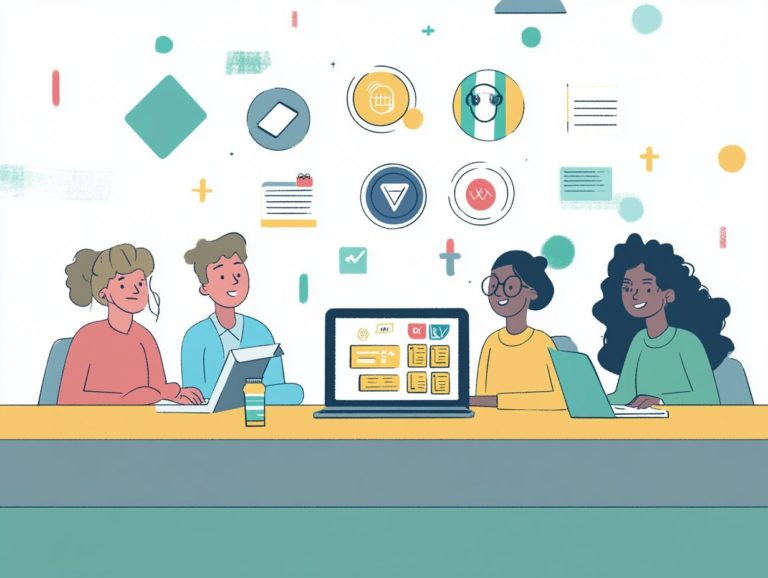The Role of Technology in Modern Skill Enhancement
In today s fast-paced world, the landscape of skill enhancement is evolving rapidly, driven largely by technological advancements. You have access to an array of tools that are reshaping how you acquire new skills. These range from virtual reality simulations that provide immersive learning experiences to online platforms that make education more accessible than ever.
This article delves into the various technological tools available for skill enhancement. It examines their impact on the job market and addresses the challenges and criticisms that accompany their use. It also explores upcoming trends that could further revolutionize skill development. Ready to dive into the world of skill enhancement?
Contents
- Key Takeaways:
- Technological Advancements for Skill Enhancement
- The Impact of Technology on the Job Market
- Challenges and Criticisms of Using Technology for Skill Enhancement
- Future Possibilities and Trends in Technology and Skill Enhancement
- Frequently Asked Questions
- What is the role of technology in modern skill enhancement?
- How does technology help improve skills?
- What are some examples of technology used in modern skill enhancement?
- Can technology enhance both hard and soft skills?
- How does technology contribute to continuous learning and development?
- Is technology the future of skill enhancement?
Key Takeaways:

- Technology offers innovative solutions for skill enhancement, such as virtual reality and online learning platforms.
- The job market has been significantly impacted by technology, leading to changing skill requirements and growth opportunities.
- Addressing challenges like accessibility and dependence on technology is essential as we explore future trends in skill enhancement.
Defining Skill Enhancement and its Importance
Skill enhancement includes processes designed to elevate your abilities and competencies across various domains, including communication and critical thinking. These skills are vital for building professional relationships and nurturing your emotional well-being.
In today’s world, the importance of skill enhancement is paramount. It helps address challenges like social anxiety and the effects of isolation, especially in the context of group therapy and online therapy options available on digital platforms.
By cultivating these skills, you can foster emotional resilience and develop a supportive network in both personal and professional settings. For example, mastering critical thinking allows you to analyze challenges logically, aiding in decision-making that aligns with your values and aspirations.
Honing active listening skills creates deeper connections and facilitates mutual understanding key ingredients for successful relationship-building. Various therapy modalities, such as cognitive-behavioral therapy (CBT) a type of therapy that helps change negative thinking patterns and interpersonal therapy, highlight the importance of these skills. They show that enhancing your abilities is crucial not only for overcoming personal hurdles but also for improving workplace dynamics.
Ultimately, skill enhancement becomes a bridge to a more fulfilling life.
Technological Advancements for Skill Enhancement
The advent of technology has transformed how you approach skill enhancement. Digital platforms now provide personalized learning experiences that cater to your unique needs. This change helps you unlock your potential. Skill enhancement is now easier and more effective than ever before.
Virtual Reality and Simulations
Virtual reality (VR) and simulations are cutting-edge technologies that deliver immersive experiences aimed at skill enhancement. You can practice and cultivate social skills in controlled environments, allowing you to confront real-world challenges without the risks of face-to-face interactions.
For instance, VR applications in role-playing scenarios empower you to navigate complex social situations, like job interviews or networking events. This not only sharpens your communication abilities but also provides real-time feedback to enhance your skills further.
Educational institutions and corporations leverage virtual environments to create safe spaces where you can develop empathy by stepping into others’ shoes. This practice fosters emotional intelligence. Moreover, VR has found its way into therapeutic settings for anxiety and social phobias, enabling clients to engage with simulated environments.
These innovative applications illustrate how VR can significantly enhance your social capabilities and emotional well-being. Explore these tools further, and start your skill enhancement journey today!
Online Learning Platforms
Online learning platforms have revolutionized education, allowing you to engage in personalized learning experiences that cater specifically to your unique style. This transformation makes skill enhancement not only more accessible but also remarkably efficient.
These digital environments cultivate vital skills such as communication and critical thinking essential elements for both emotional well-being and professional achievement.
Take platforms like Coursera and Udemy, for example. They provide a vast selection of courses that extend beyond traditional academic subjects to include soft skills and leadership development. You can participate in interactive discussions that help you cultivate important social competencies and empathy through collaborative projects.
Tools like Kahoot and Miro enhance critical thinking through gamified learning and visual collaboration. This vibrant atmosphere fosters emotional intelligence and a sense of community among learners, ensuring you are well-prepared for the challenges of the real world.
In the end, the amazing flexibility and variety these platforms offer empower you to take charge of your learning adventure!
Artificial Intelligence and Machine Learning

Artificial intelligence (AI) and machine learning (ML), technologies that allow computers to learn from data, are leading the charge in technological advancements. They significantly enhance your skill development by offering personalized learning pathways through data analytics.
These technologies provide tailored educational experiences that adapt to how you learn best, nurturing critical thinking and effective communication skills that are vital for emotional well-being.
By harnessing vast amounts of data, AI and ML can pinpoint knowledge gaps and identify your unique learning style, empowering educators to adjust their teaching strategies to better suit your needs. For example, adaptive learning platforms utilize algorithms to analyze your interactions, providing resources and challenges that resonate with your pace.
This creates an engaging environment that not only boosts comprehension but also inspires you to take control of your own learning journey.
Data analytics enables educators to identify trends in your performance, leading to actionable insights that refine curriculum design and intervention strategies, ultimately driving superior academic outcomes for you.
The Impact of Technology on the Job Market
The impact of technology on the job market is profound, reshaping the skills needed across various roles and highlighting the critical importance of ongoing employee training. You ll find that areas such as social skills, communication, and critical thinking are becoming increasingly essential.
As technology continues to evolve, you must adapt quickly to thrive, often turning to online learning opportunities to remain relevant and competitive in this ever-changing digital landscape.
How Technology is Changing the Skills Required for Jobs
Technology is evolving at a breakneck pace, transforming the skills you need for success in today s job market. This shift demands a heightened focus on digital literacy, communication skills, and social acumen.
As organizations increasingly turn to digital platforms for collaboration and interaction, it s essential for you to adapt to these changing expectations.
Industries like healthcare, finance, and manufacturing are undergoing remarkable transformations, underscoring the urgent need for professionals like you to embrace innovative tools such as online healthcare services, fintech solutions, and automated production systems.
To remain competitive, it s vital for companies to prioritize continuous employee training that goes beyond mere technical skills. Emotional intelligence and teamwork are just as crucial. For example, in the healthcare field, you must be proficient in using electronic health records while also excelling in patient communication.
Likewise, financial analysts must navigate complex software and present data insights effectively to clients. Ultimately, fostering a culture of ongoing learning is essential, ensuring you are fully equipped to thrive in this dynamic landscape.
Challenges and Criticisms of Using Technology for Skill Enhancement
While technological advancements provide a wealth of opportunities for enhancing your skills, they also introduce challenges and criticisms surrounding accessibility and equity.
Relying heavily on technology can create isolation effects, hindering your personal and professional growth, especially if you lack access to essential digital tools and resources.
It’s important to navigate this landscape mindfully, ensuring that everyone has the chance to thrive in an increasingly digital world.
Accessibility and Equity Concerns
Concerns about accessibility and equity are paramount in the landscape of technology-driven skill enhancement. Not everyone enjoys equal access to digital platforms and resources.
This gap limits exciting opportunities for growth and can profoundly impact skill development and emotional well-being.
Imagine low-income communities where insufficient internet access constrains educational resources and online courses. Residents face notable disadvantages compared to their more affluent peers.
Individuals with disabilities often encounter challenges in finding tools that help people with disabilities that are both affordable and effective. This limits their ability to engage in digital training programs.
These barriers not only impede personal growth but also amplify social inequalities. Entire communities are often left without essential skills needed to navigate today’s increasingly tech-driven job market.
These access gaps create a cycle of exclusion. Many are left behind in seeking valuable advancement opportunities.
Dependence on Technology

Relying heavily on technology for skill enhancement can lead to feelings of isolation, potentially harming your emotional well-being and interpersonal relationships.
As you increasingly turn to digital tools for communication, you might find it challenging to develop essential social skills and engage in face-to-face interactions.
This dependence can turn screens into your primary channels for social engagement. These interactions often lack the richness of in-person conversations and may impede your emotional intelligence.
The subtle cues of body language and facial expressions vital for understanding and fostering empathy can easily be lost in virtual exchanges.
Act now to cultivate environments that promote direct communication. Workshops focused on emotional intelligence and team collaboration can help you bridge the gap, allowing you to practice and refine your interpersonal skills.
Embrace tech-free zones or activities. This practice encourages genuine connections and helps balance your relationship with technology.
Future Possibilities and Trends in Technology and Skill Enhancement
The future of technology and skill enhancement presents an exciting landscape for you. With emerging innovations such as artificial intelligence and virtual reality on the horizon, the realm of education and training is poised for transformation.
These advancements promise to deliver more engaging and effective learning experiences. Get ready to embrace exciting innovations in skill enhancement!
Emerging Technologies and their Potential Impact
Emerging technologies like artificial intelligence, virtual reality, and mobile learning are changing the way we enhance our skills. These tools provide exciting new ways to learn and grow.
For instance, artificial intelligence can analyze your individual learning patterns and customize educational content to maximize your engagement and retention.
Virtual reality immerses you in realistic simulations, allowing you to gain hands-on experience in fields like medicine and engineering. This helps enhance your practical skills without the typical risks involved.
Meanwhile, mobile learning platforms empower you to access resources anytime and anywhere. This fosters a more flexible and personalized learning journey.
These advancements can transform education, but they also bring challenges, like unequal access to technology. It’s crucial to approach these innovations with care to ensure equitable access for all learners.
Frequently Asked Questions
What is the role of technology in modern skill enhancement?
Technology is revolutionizing how we learn! It provides access to a vast array of resources and tools that aid in developing new skills. It also allows for personalized and efficient learning experiences.
How does technology help improve skills?

Technology provides a platform for interactive and engaging learning, making it easier to acquire new skills and knowledge. It also offers instant feedback and tracks progress, allowing individuals to identify areas for improvement.
What are some examples of technology used in modern skill enhancement?
Some examples include online courses, educational apps, virtual reality simulations, and AI-powered personalization tools. These technologies offer a wide range of options for individuals to enhance their skills in various fields.
Can technology enhance both hard and soft skills?
Yes, technology can enhance both hard and soft skills. Hard skills, such as coding or data analysis, can be improved through online courses and practice. Soft skills, such as communication and teamwork, can be developed through virtual reality simulations and interactive games.
How does technology contribute to continuous learning and development?
Technology enables individuals to access learning materials and resources anytime and anywhere, promoting continuous learning and development. It also offers adaptive learning, which adjusts to an individual’s pace and level of understanding.
Is technology the future of skill enhancement?
Technology is already a vital part of modern skill enhancement, and it is expected to continue to play a significant role in the future. Understanding why skill enhancement is vital in today’s job market will highlight how technology, as it evolves and advances, will provide even more innovative ways for individuals to enhance their skills and knowledge.
Explore these technologies and consider enrolling in courses to enhance your skill set!






